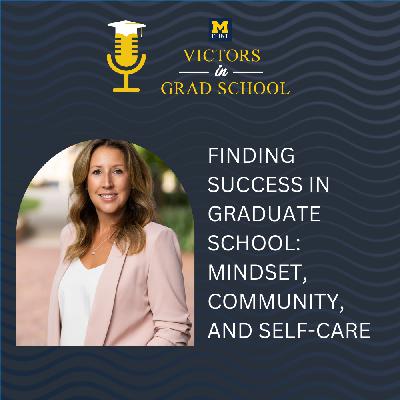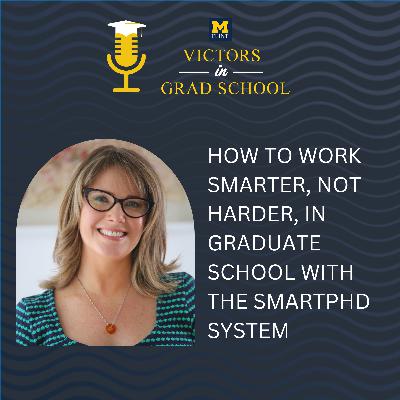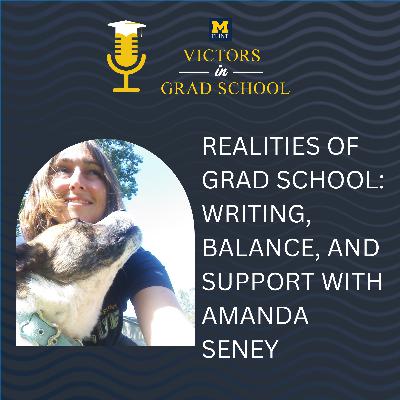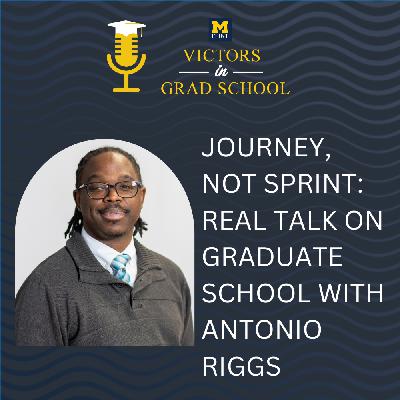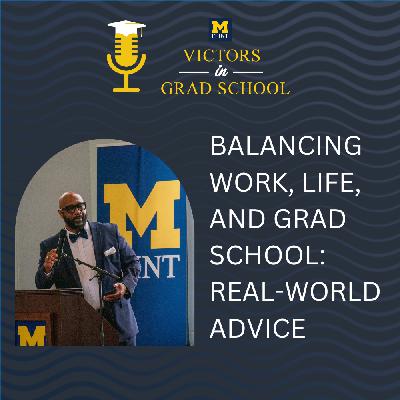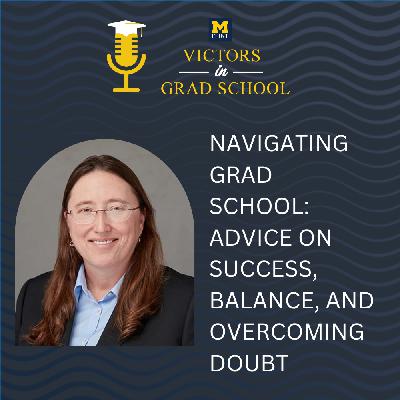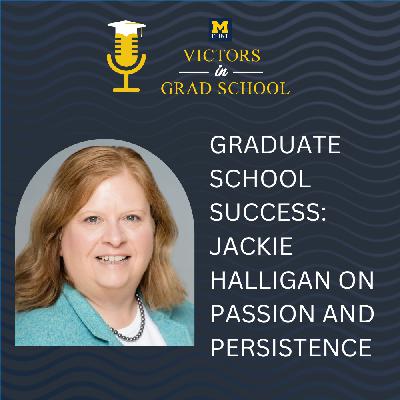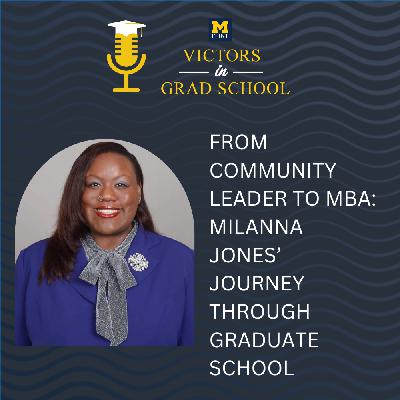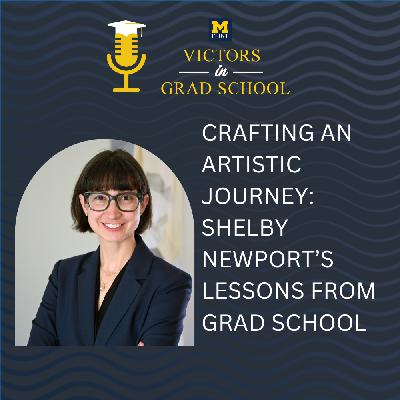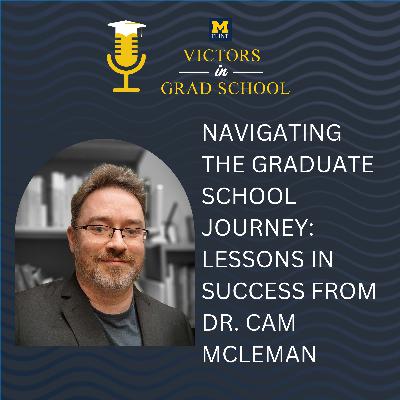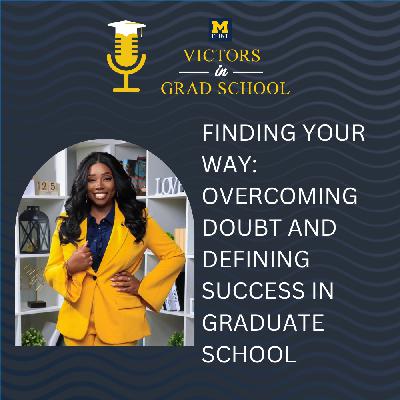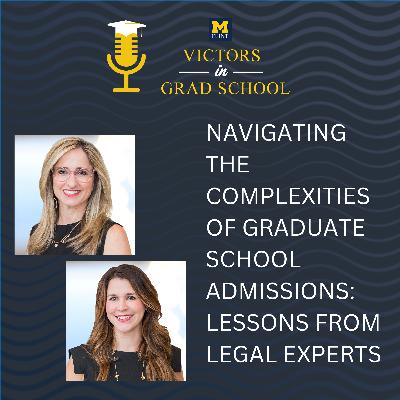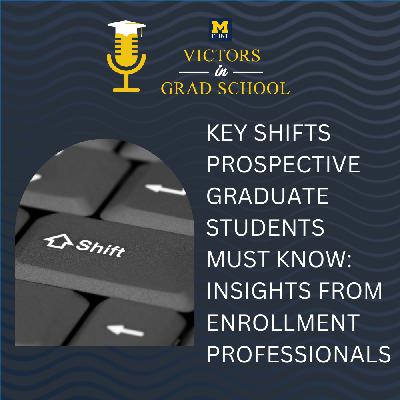Finding Success in Graduate School: Mindset, Community, and Self-Care
Description
Embarking on the journey of graduate school is both exciting and challenging, a truth eloquently explored in the recent episode of Victors in Grad School featuring Dr. Melissa Sreckovic, Associate Professor of Education and Director of the Honors Program at the University of Michigan-Flint. Hosted by Dr. Christopher Lewis, the conversation delves into the realities of graduate education, highlighting transformative experiences and sharing practical wisdom for current and prospective students.
A central theme of the discussion is the importance of mindset. Dr. Sreckovic reflects on her transitions—from classroom teacher to graduate student, then onto a doctoral program—emphasizing the need to adjust expectations and embrace continuous learning. She recounts how her drive to better support students with disabilities, particularly those with autism, sparked her ambition for advanced study. This personal motivation underlines the significant impact that meaningful experiences can have in shaping academic and career journeys.
The episode also addresses the challenge of imposter syndrome, a feeling all too familiar for many graduate students, especially those who are first-generation college attendees. Dr. Sreckovic shares candidly about moments of self-doubt and the steps she took to reaffirm her sense of belonging. Importantly, she advocates for building a “community of safe people”—mentors and peers who offer guidance, encouragement, and camaraderie. This theme of community recurs throughout the conversation, with both Dr. Sreckovic and Dr. Lewis stressing the value of collaboration and finding supportive networks within graduate programs.
Work-life balance and time management are further touchpoints, with Dr. Sreckovic offering practical strategies: block out dedicated study time, stay organized with to-do lists, and use even small windows of opportunity productively. She also highlights the necessity of self-care and seeking campus support services, such as counseling, to prevent burnout and maintain well-being.
The conversation rounds out with reflections on the broader skills gained in graduate school, including the power of networking and the importance of listening to diverse perspectives. Dr. Sreckovic encourages prospective students to research programs, get involved, seek funding opportunities, and, above all, to believe in their own place within the academic community.
If you’re contemplating graduate school or are in the midst of your own journey, this episode offers reassurance, actionable advice, and inspiration. Listen in to gather tools for your own toolbox—and remember, you’re never alone on this path to success.
Tune into Victors in Grad School to hear the full conversation and gain more insights on thriving in graduate education!
TRANSCRIPTS
Dr. Christopher Lewis [00:00:01 ]:
Welcome to Victors in Grad School, where we have conversations with students, alumni, and experts about what it takes to find success in graduate school.
Dr. Christopher Lewis [00:00:11 ]:
Welcome back to Victors in Grad School. I'm your host, Dr. Christopher Lewis, Director of Graduate Programs at the University of Michigan, Flint. Really excited to have you back again. And as always, you and I are on a journey. We are on a journey. As you are preparing and thinking about graduate school, maybe you are just starting that process for yourself where you're trying to determine what you're going to do, what you want to do next to get to reach those goals that you have for yourself. Maybe you've already applied and you figured out the programs that you're applying to and you're waiting for that decision in the mail or in your email.
Dr. Christopher Lewis [00:00:48 ]:
Or maybe you're already in graduate school and you're working your way through the process. You see that light at the end of the tunnel and. And you are trying to figure out what it means to be a graduate student and how you can be best successful no matter where you are. This podcast was developed to help you to be able to find success sooner. That's why every week, I love being able to bring you different guests with different experiences, different perspectives that can talk to you about their own experiences in going through graduate school so you can gain some tools for your toolbox to help you along your own journey. Today we've got another great guest. Dr. Melissa Sarkovic is with us today.
Dr. Christopher Lewis [00:01:30 ]:
And Melissa is an associate professor of education and the director of the Honors Program at the University of Michigan, Flint. And I'm really excited to be able to have her here to talk about her own experience and to share that with you. Melissa, thanks so much for being here today.
Dr. Melissa Sreckovic [00:01:44 ]:
Thank you for having me.
Dr. Christopher Lewis [00:01:45 ]:
Well, I love being able to talk to people about their own experiences. And I know that you did your undergraduate work at Michigan State University. You got that back. Bachelor of Arts in elementary education. And after graduation, you went out, you worked for a bit, you became a teacher. And at some point, at some point in those early years of teaching, you got a spark. There was something that made you start to think, maybe I want to go and get a graduate degree. Bring me back to that moment.
Dr. Christopher Lewis [00:02:19 ]:
And why did you decide that graduate school was the. Why it was the right time for you to go to graduate school and why you ultimately decided to go to graduate school?
Dr. Melissa Sreckovic [00:02:30 ]:
Well, after I graduated from Michigan State, I moved to Cary, North Carolina, where I began my teaching career as a third grade teacher. And right before school started the principal came to the third grade team and said, what teacher wants to be the inclusion teacher this year who wants to have the students with disabilities in their class? And I eagerly said, I do. And. And of course, that's not how things work anymore. This was a while ago. And so I had just the best experience my first year teaching students with and without disabilities in the classroom. I was able to collaborate with a special education teacher, and I realized that I still had a lot to learn about special education. And if I was going to be a really solid teacher and meet the multifaceted needs of these students in my class, that I needed more information.
Dr. Melissa Sreckovic [00:03:24 ]:
I needed a different skill, skill set. And so that's what prompted me to get my master's and a focus in special education. And I went back to Michigan State for a couple reasons. It was comfortable. I already knew some of the professors there, and also because of the format, I was living in North Carolina. I wanted to stay in North Carolina, and I wanted to continue teaching. I didn't want to take a break from teaching. So I was looking for an online program that I could do mostly on the weekends so that I could really focus on my students in my classroom.
Dr. Melissa Sreckovic [00:03:55 ]:
And Michigan State afforded me that opportunity. So that was why. That's why I decided to go back for my master's.
Dr. Christopher Lewis [00:04:02 ]:
Now, I know that you got that master's degree. You finished up, went back, worked with your students, engaged yourself within your. Your classroom and in your school. But then again, two years later, you had that inkling again, and you decided that you wanted to go further, and you ultimately decided to get a doctorate degree in special education in Autism Spectrum Disorder. And you. You decided to go to the University of North Carolina, Chapel Hill. So talk to me about what made you decide that you wanted to take that next step and get the PhD versus just staying at the master's level.
Dr. Melissa Sreckovic [00:04:39 ]:
So I taught a student with autism, and he just really changed the trajectory of me for my professional life. And I just understood him. We got each other. I was his safe person. When he moved on to fourth grade, into fifth grade, he would come back to my classroom if he was 15, feeling overwhelmed. And I realized that he was really misunderstood by other teachers in the school, by other students in the school, by parents. And he is such a great kid. He's brilliant.
Dr. Melissa Sreckovic [00:05:12 ]:
He's so kind, so empathetic. And I thought, you know what? I can. I want to go back to school so that I can better prepare teachers to work with students like him so that they really understand the strengths and value that kiddos like him bring to the classroom. And really to help teachers foster a classroom community where everyone in their class belongs and understands their value. So that was really why I decided to go back to graduate school to get my PhD, because I really wanted to learn more about autism and how I could better support teachers in supporting their students on the spectrum. So, so when I was looking at doctoral programs, I was looking for a place that had researchers doing work on autism. So UNC Chapel Hill had some of the biggest autism researchers around the world. Dr.
Dr. Melissa Sreckovic [00:06:04 ]:
Sam Odom, Dr. Gary Meziboff, Dr. Kara Hume, were doing some really phenomenal research at UNC Chapel Hill. So I decided to go for an informational session and learn a little bit more.

